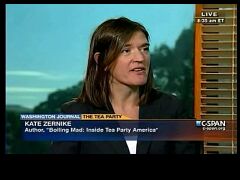Kate Zernike Finds Political Conspiracy Theories Driven by Conservative Themes, Racism
Zernike, whose Tea Party coverage is marked by hostility and accusations of racism, found a source to selectively pluck out links between conspiracy theorizing and conservative values, plus racism: "As [professor Robert Alan] Goldberg writes....'Conspiracy theory draws power by merging with and reinforcing traditional American values and beliefs: a sense of mission, Protestant supremacy, concerns about encroachments on liberty, anti-elitism, maintenance of the racial order, and the sanctity of private property.'"
Published: 5/2/2011 1:31 PM ET
New York Times Tea Party reporter Kate Zernike made the front of the Sunday Week in Review with "Conspiracies Are Us - The endless debate over Obama's birth certificate and the paranoid style in American politics." While mentioning in passing the left-wing conspiracy theory that 9-11 was plotted by the Bush administration, Zernike used her selective sources to point toward historical conservatism as a grand villain.
Zernike, whose Tea Party coverage is marked by hostility and accusations of racism, found a professor to selectively pluck out links between conspiracy theorizing and historically conservative values, complete with more accusations of racism.
You can follow Times Watch on Twitter.
So much for Mr. Obama's hopes of stopping the "silliness."
To many, those who doubt Mr. Obama's citizenship are driven simply by racial prejudice; they are unwilling to allow that America's first black president could hold the office legitimately.
Many scholars of conspiracy theory agree. But they also note that such theories are hardly unique to Mr. Obama; they have a long history in the United States and elsewhere, coming from left and right, covering all sorts of subjects, political and otherworldly (the twin towers were not hit by airplanes; Paul is dead). And those who doubt Mr. Obama's citizenship fit the mold of other conspiracy theorists: they don't loose their grip on their beliefs easily, if at all.
....
Eighty percent of Americans, he said, believe that President Kennedy was killed by a conspiracy, rather than a lone gunman, as a government commission affirmed. Thirty percent believe that the government covered up aliens' landing in Roswell, N.M., and a third of American blacks believe that government scientists created AIDS as a weapon of black genocide. Sept. 11, of course, has inspired conspiracy theories - it was plotted, variously, by "the Jews," the Bush administration or Saddam Hussein.
Zernike, whose Tea Party coverage is marked by hostility and accusations of racism, found a professor to selectively pluck out links between conspiracy theorizing and historically conservative values, complete with more accusations of racism.
But the strong embrace of conspiracy theories is also embedded in the American experience. A fear of enemies - real and imagined, internal and external - defined those who forged this country. A place created as God's country was bound to see the subversions of Satan behind every uncertain turn.
As [Univ. of Utah professor Robert Alan] Goldberg writes in an encyclopedia, "Conspiracy Theories in American History": "Conspiracy theory draws power by merging with and reinforcing traditional American values and beliefs: a sense of mission, Protestant supremacy, concerns about encroachments on liberty, anti-elitism, maintenance of the racial order, and the sanctity of private property."
In this analysis, it's not surprising that the first black president, educated in the Ivy League, would become the subject of a conspiracy theory. Many conspiracy theorists believe not only that the president lied about his birthplace and his religious faith (in their rendition, he is a Muslim, another theory that has survived despite all evidence). They will also argue as blindly that the president is going to take away Americans' guns and put them in re-education camps.
You can follow Times Watch on Twitter.



